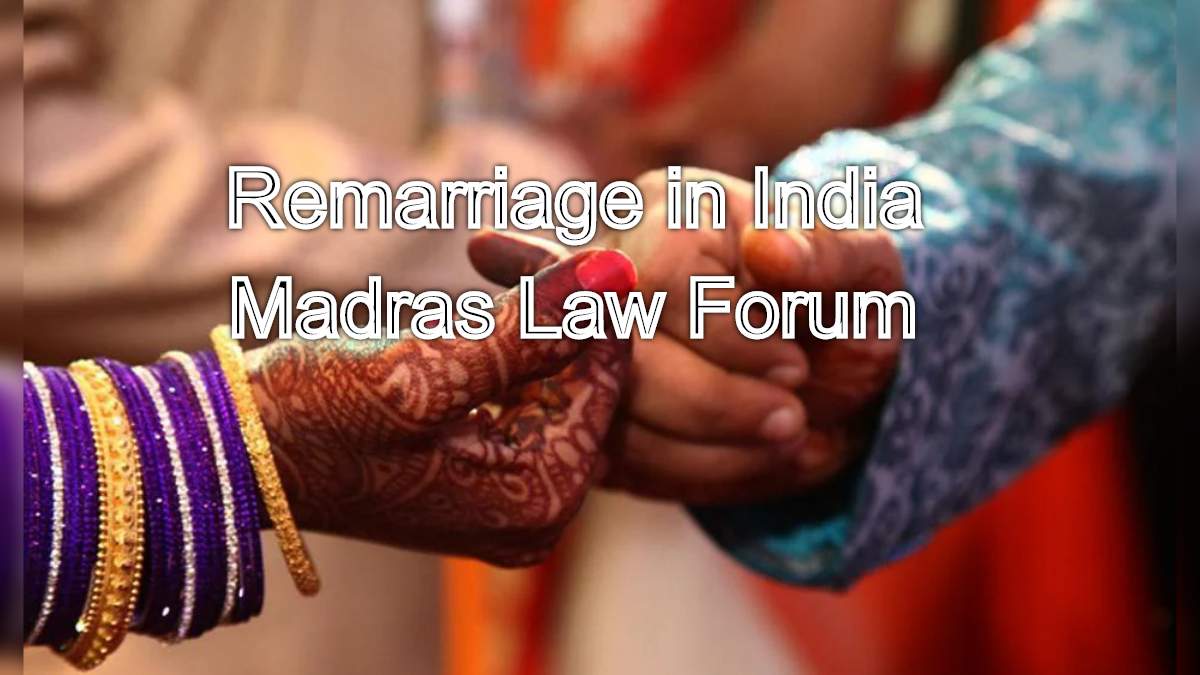Can I remarry after obtaining a divorce: Life’s journey is rarely linear. Sometimes, paths diverge, and marriages dissolve. However, even after a divorce, the possibility of love and companionship can blossom anew. This begs the question: can you remarry after obtaining a divorce in India? The answer, like many legal matters, is nuanced. Here, Madras Law Forum sheds light on the legal landscape surrounding remarriage after divorce in India.
Remarriage After Divorce in India: Navigating the Legal Landscape with Clarity (Madras Law Forum)
Understanding the Grounds for Remarriage
Indian law permits remarriage after divorce. The specific provisions vary slightly depending on the religion governing the marriage. However, in general, as long as the divorce decree is final and there are no legal impediments, both parties are free to remarry.
Religion-Specific Considerations
Transitioning to the legalities based on religion, let’s delve into some key points:
- Hindu Marriage Act: Under the Hindu Marriage Act, 1955, both spouses can remarry after a final divorce decree. However, certain restrictions apply during the iddat period, a waiting period mandated for women after the dissolution of marriage.
- Muslim Marriage Act: The Muslim Marriage Act, 1954, allows a woman to remarry only after completing the iddat period and fulfilling certain conditions like returning her dower (mehr) to the former husband. Men, on the other hand, can generally remarry without restrictions.
- Christian Marriage Act: The Indian Divorce Act, 1869, governs remarriage for Christians in India. Here, both parties can remarry after obtaining a final divorce decree.
- Parsi Marriage and Divorce Act: The Parsi Marriage and Divorce Act, 1936, permits remarriage for Parsis after a final divorce decree. However, adultery by the wife is considered a valid ground for the husband to restrict her remarriage.
Essential Considerations Before Remarriage
While the law allows remarriage, certain crucial considerations should be addressed before taking the next step:
- Finalization of Divorce Decree: Ensure the divorce decree is final and binding. Any pending appeals or unresolved issues can delay or complicate remarriage.
- Child Custody Arrangements: If children are involved from the previous marriage, it’s vital to have a clear child custody arrangement in place before remarrying. A lawyer can help ensure the child’s well-being is prioritized.
- Financial Settlements: Outstanding financial obligations or property disputes from the previous marriage need to be settled before remarrying. Consulting a lawyer can ensure a clear financial picture and avoid future complications.
- Transparency with New Partner: Open and honest communication with your new partner regarding your previous marriage and any associated legal or emotional baggage is essential for a healthy relationship.
Addressing Common Concerns
Here, Madras Law Forum tackles some frequently asked questions about remarriage after divorce in India:
No, remarriage during the iddat period is generally not advisable. Legal complications may arise, and social stigma can be attached. Wait for the iddat period to conclude before proceeding with remarriage.
Objections from the ex-spouse, unless based on valid legal grounds outlined in the relevant marriage act, cannot prevent your remarriage. However, seeking legal advice is recommended if your ex-spouse creates undue trouble.
Open communication with your children about your remarriage is crucial. Their emotional well-being should be a priority. Consider involving them in the process gradually and providing a safe space for their questions and anxieties.
A lawyer can guide you through the legal intricacies of remarriage based on your specific circumstances. They can ensure compliance with relevant laws, address financial settlements, and draft prenuptial agreements (if desired) to safeguard your interests.
Madras Law Forum offers a wealth of resources on family law, including information on remarriage. Additionally, government websites of the Ministry of Law and Justice and relevant state legal services authorities can provide valuable insights.
Conclusion: Embracing a New Chapter with Confidence
Remarriage after divorce can be a joyous occasion, marking a new beginning. By understanding the legal framework and addressing potential challenges proactively, you can confidently embark on this exciting chapter. Madras Law Forum stands ready to offer guidance and support throughout the process. Remember, legal advice tailored to your specific situation is always recommended to ensure a smooth and successful transition.
Read More
- How Can I seek legal remedies for issues related to dowry harassment or cruelty? Expert Advice
- Criminal offenses recognized under Indian Law: How to Learn?
- Filing a Criminal Complaint FIR (First Information Report): Expert Advice
- What is administrative law in India? Expert Legal Remedies
- What is Intellectual property law? How to find the Best Attorney?
- Ministry of Law and Justice:
